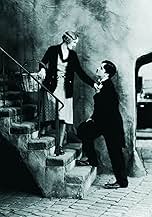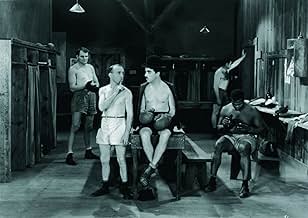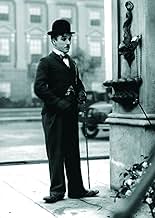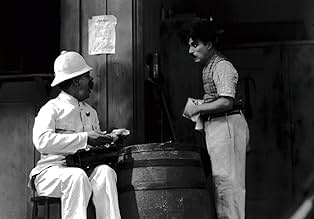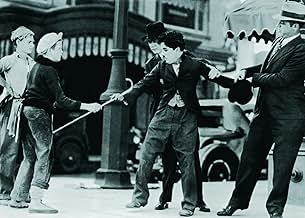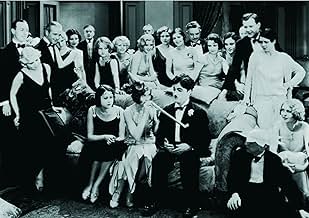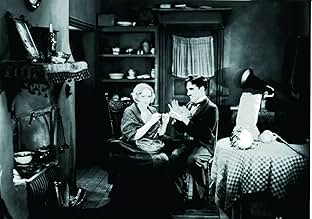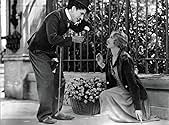Charlot vagabond vient en aide à une jeune fleuriste aveugle et se fait passer pour un homme riche. A force de travail il réunit assez d'argent pour que la jeune fille recouvre la vue.Charlot vagabond vient en aide à une jeune fleuriste aveugle et se fait passer pour un homme riche. A force de travail il réunit assez d'argent pour que la jeune fille recouvre la vue.Charlot vagabond vient en aide à une jeune fleuriste aveugle et se fait passer pour un homme riche. A force de travail il réunit assez d'argent pour que la jeune fille recouvre la vue.
- Director
- Writers
- Stars
- Prix
- 6 victoires au total
Charles Chaplin
- A Tramp
- (as Charlie Chaplin)
Al Ernest Garcia
- The Millionaire's Butler
- (as Allan Garcia)
Johnny Aber
- Newsboy
- (uncredited)
Jack Alexander
- Boxing Match Spectator
- (uncredited)
T.S. Alexander
- Doctor
- (uncredited)
Victor Alexander
- Superstitious Boxer
- (uncredited)
Albert Austin
- Street Sweeper
- (uncredited)
- …
Harry Ayers
- Cop
- (uncredited)
Eddie Baker
- Boxing Fight Referee
- (uncredited)
Henry Bergman
- Mayor
- (uncredited)
- …
Edward Biby
- Nightclub Patron
- (uncredited)
Buster Brodie
- Bald Party Guest
- (uncredited)
Jeanne Carpenter
- Diner in Restaurant
- (uncredited)
Sommaire
Reviewers say 'City Lights' is celebrated for its blend of comedy and pathos, showcasing Charlie Chaplin's iconic Tramp character in a poignant love story with a blind flower girl. The film is praised for its masterful physical comedy, expressive acting, and memorable scenes, particularly the boxing match and the emotional finale. Chaplin's direction, composition of the score, and the film's historical significance are frequently highlighted. However, some reviewers note that the silent format and slow pacing may challenge modern audiences. The themes of love, selflessness, and social commentary resonate deeply, making 'City Lights' a timeless classic.
Avis en vedette
If there is one Charlie Chaplin film to recommend, as others have pointed to in the past, City Lights is the one. Though Chaplin played his Tramp character superbly in other movies, like Modern Times and The Gold Rush, City Lights displays the Tramp at his funniest, his bravest, his most romantic, and his most sympathetic. It's tough for filmmakers in recent days to bring the audience so close emotionally with the characters, but it's pulled off.
The film centers on three characters- the Tramp, the quintessential, funny homeless man who blends into the crowd, but gets caught in predicaments. He helps a drunken businessman (Myers, a fine performance in his own right) from suicide, and becomes his on and off again friend (that is, when it suits him and doesn't notice his 'friend's' state). The other person in the Tramp's life is the Blind Flower Girl (Virginia Cherrill, one of the most absorbing, beautiful, and key female performances in silent film), who are quite fond of each other despite the lack of total perception. The emotional centerpiece comes in obtaining rent and eye surgery money, which leads to a (how else can I put it) magical boxing match where it's basically a 180 from the brutality and viscerality of a match in say Raging Bull.
Though there is no dialog, the film achieves a timelessness- it's essentially a tale of two loners who find each other, lose each other, and find each other again (the last scene, widely discussed by critics for decades, is moving if not tear-inducing). And it's never, ever boring- once you get along with the Tramp, you find the little things about him, the reaction shots, the little things he does after the usual big gag (look to the ballroom scene for examples of this, or when he gets a bottle of wine poured down his pants without the other guy noticing). Truth be told, if this film makes you indifferent, never watch Chaplin again. But if you give yourself to the film, you may find it's one of the most charming from the era, or perhaps any era.
The film centers on three characters- the Tramp, the quintessential, funny homeless man who blends into the crowd, but gets caught in predicaments. He helps a drunken businessman (Myers, a fine performance in his own right) from suicide, and becomes his on and off again friend (that is, when it suits him and doesn't notice his 'friend's' state). The other person in the Tramp's life is the Blind Flower Girl (Virginia Cherrill, one of the most absorbing, beautiful, and key female performances in silent film), who are quite fond of each other despite the lack of total perception. The emotional centerpiece comes in obtaining rent and eye surgery money, which leads to a (how else can I put it) magical boxing match where it's basically a 180 from the brutality and viscerality of a match in say Raging Bull.
Though there is no dialog, the film achieves a timelessness- it's essentially a tale of two loners who find each other, lose each other, and find each other again (the last scene, widely discussed by critics for decades, is moving if not tear-inducing). And it's never, ever boring- once you get along with the Tramp, you find the little things about him, the reaction shots, the little things he does after the usual big gag (look to the ballroom scene for examples of this, or when he gets a bottle of wine poured down his pants without the other guy noticing). Truth be told, if this film makes you indifferent, never watch Chaplin again. But if you give yourself to the film, you may find it's one of the most charming from the era, or perhaps any era.
Chaplin takes himself a little more seriously in City Lights, and the results are spectacular. The musical score which Chaplin composed for the film was one of the many highlights, and even though Charlie's performance is much more dramatic than usual in some scenes, the hilarious comedy for which he is known and loved is still abundant.
City Lights is so well made that it is one of the very few movies in which the obvious flaws can be gladly overlooked. Yes, you can clearly see the string holding Chaplin up in the sidesplittingly funny boxing scene, but who cares? That is such classic slapstick that little things like that really don't matter. Besides, let's keep in mind that this movie was made seventy years ago.
Chaplin does a phenomenal job in his traditional role of the tramp, and develops a perfectly convincing romantic relationship with the blind flower girl on the sidewalk. His friendship with the drunken rich guy is hilarious, but it also makes a significant comment about the problems of alcohol. This is truly a great film, which should not be forgotten.
City Lights is so well made that it is one of the very few movies in which the obvious flaws can be gladly overlooked. Yes, you can clearly see the string holding Chaplin up in the sidesplittingly funny boxing scene, but who cares? That is such classic slapstick that little things like that really don't matter. Besides, let's keep in mind that this movie was made seventy years ago.
Chaplin does a phenomenal job in his traditional role of the tramp, and develops a perfectly convincing romantic relationship with the blind flower girl on the sidewalk. His friendship with the drunken rich guy is hilarious, but it also makes a significant comment about the problems of alcohol. This is truly a great film, which should not be forgotten.
City Lights is simply put one of the best movies out there. Every scene is classic and had a huge impact on the history of film-making. Chaplin's last 'silent' film tells the story of a poor little man the tramp played by Chaplin who falls in love with a blind flower girl. He becomes friends with a wealthy man who constantly tries to commit suicide. The man only recognizes the tramp character when he is drunk. To impress the flower girl the tramp uses the man's wealth to make her fall in love with him. The only problem is that when the man is sober he doesn't recognize the tramp anymore. On top of this the flower girl has to pay 22 dollars of rent or she will be thrown out of her apartment. Now the tramp desperately seeks for jobs in the city to help his love. Out of this simple plot great comedy and heart breaking moments come forth.
The outcome of the movie is to almost all people known. It is regarded as one of the best endings ever taped on film. The movie itself still is masterpiece more than 70 years after it's release. I personally rate this as Chaplin's second best I have seen so far. My favorite remains The Gold Rush. Still this movie gets 5/5 stars from me.
The outcome of the movie is to almost all people known. It is regarded as one of the best endings ever taped on film. The movie itself still is masterpiece more than 70 years after it's release. I personally rate this as Chaplin's second best I have seen so far. My favorite remains The Gold Rush. Still this movie gets 5/5 stars from me.
City Lights (1931)
**** (out of 4)
Charlie Chaplin returns as The Tramp and this time he falls in love with a blind girl (Virginia Cherrill) and sets out to help her. The Tramp eventually meets a suicidal drunk (Harry Myers) and their friendship leads to what might eventually help the girl he loves.
Chaplin made great films before and after CITY LIGHTS but for my money this here is his greatest film as well as one of the greatest films ever made. Not only is it one of the funniest movies ever made but I'd also argue that it's one of the greatest love stories, if not the greatest. It really says a lot when a movie can conqueror two genres at one time but CITY LIGHTS is simply one of the greatest movies ever made.
I think it says a lot that you get one classic scene after another and there's really not a weak spot to be found here. Being 1931 it took some real guts for Chaplin to deliver a silent film and I think he knew that he had to deliver something special because people had moved onto sound. He certainly delivered something special as this here was easily the funniest film he had made up to this point. The opening sequence with the introduction of The Tramp was priceless and we got one hilarious scene after another from that point.
The scenes with the drunk are downright hilarious as is another scene where The Tramp is trying to eat but without much success. The cigar sequence is a masterpiece as is the by the water. In fact, the story between The Tramp and the drunk would have made a terrific movie on its own. Just like the stuff with The Tramp and the blind girl would have made a perfect film. What's so special is that you get both stories wrapped up in one and it really delivers.
Chaplin played The Tramp countless times but he was never better than he is here. Just check out the timing in countless scenes including the boxing match and you can't help but be impressed with the actor. Myers also deserves a lot of credit as the drunk as his timing has to match that of Chaplin throughout and the two men do a wonderful job together. Then you've got Cherrill who wasn't a professional actor but the director makes her shine throughout.
CITY LIGHTS contains one great scene after another and all of the laughs lead up to one of the most powerful endings in film history. There's really not enough great things that can be said about this film as it continues to get better with each passing year.
**** (out of 4)
Charlie Chaplin returns as The Tramp and this time he falls in love with a blind girl (Virginia Cherrill) and sets out to help her. The Tramp eventually meets a suicidal drunk (Harry Myers) and their friendship leads to what might eventually help the girl he loves.
Chaplin made great films before and after CITY LIGHTS but for my money this here is his greatest film as well as one of the greatest films ever made. Not only is it one of the funniest movies ever made but I'd also argue that it's one of the greatest love stories, if not the greatest. It really says a lot when a movie can conqueror two genres at one time but CITY LIGHTS is simply one of the greatest movies ever made.
I think it says a lot that you get one classic scene after another and there's really not a weak spot to be found here. Being 1931 it took some real guts for Chaplin to deliver a silent film and I think he knew that he had to deliver something special because people had moved onto sound. He certainly delivered something special as this here was easily the funniest film he had made up to this point. The opening sequence with the introduction of The Tramp was priceless and we got one hilarious scene after another from that point.
The scenes with the drunk are downright hilarious as is another scene where The Tramp is trying to eat but without much success. The cigar sequence is a masterpiece as is the by the water. In fact, the story between The Tramp and the drunk would have made a terrific movie on its own. Just like the stuff with The Tramp and the blind girl would have made a perfect film. What's so special is that you get both stories wrapped up in one and it really delivers.
Chaplin played The Tramp countless times but he was never better than he is here. Just check out the timing in countless scenes including the boxing match and you can't help but be impressed with the actor. Myers also deserves a lot of credit as the drunk as his timing has to match that of Chaplin throughout and the two men do a wonderful job together. Then you've got Cherrill who wasn't a professional actor but the director makes her shine throughout.
CITY LIGHTS contains one great scene after another and all of the laughs lead up to one of the most powerful endings in film history. There's really not enough great things that can be said about this film as it continues to get better with each passing year.
Film has become a medium that is strongly influenced by nostalgia. Old films have become journeys to the past; ways to visit times and people that no longer are. Since film is an art that is based on the innovation of previous works, it has an element of nostalgia in its foundation. We look on the old to find what elements should make up the new. In City Lights, and other silent works of film, a passion emerges that is uniquely honest and sincere. While watching the film, I was impressed that Chaplin really did love the story, the sets, the crew; the whole project. While this may not have been the complete reality, it felt that way, and thus made the film more enjoyable. In silent films the audience is forced to be completely reliable on the visual elements of the film; there are no elaborate sound effects or dialogue to provoke an emotional response.
Since film is at its very core a visual medium, I find silent films to be the basic form of the medium. I don't use the word basic here in a demeaning sense, but I compare the beauty of silent films to the beauty of early European art, before the concept of perspective was developed in the Renaissance. Many books and tomes featured people as tall as the castles they stood in; these works of art were not technologically advanced, but they were, and are, beautiful. The same example is found when comparing early darreographs of wild animals to contemporary photographs found in National Geographic. There is a warmth found in City Lights, and other Chaplin films (The Kid, Modern Times) that would be lost in the sea of cinematic technology that floods films today. Maybe it's just that with simplicity comes honesty, and honesty is perhaps the most powerful emotion that can cross through the screen and be felt by the viewer.
Since film is at its very core a visual medium, I find silent films to be the basic form of the medium. I don't use the word basic here in a demeaning sense, but I compare the beauty of silent films to the beauty of early European art, before the concept of perspective was developed in the Renaissance. Many books and tomes featured people as tall as the castles they stood in; these works of art were not technologically advanced, but they were, and are, beautiful. The same example is found when comparing early darreographs of wild animals to contemporary photographs found in National Geographic. There is a warmth found in City Lights, and other Chaplin films (The Kid, Modern Times) that would be lost in the sea of cinematic technology that floods films today. Maybe it's just that with simplicity comes honesty, and honesty is perhaps the most powerful emotion that can cross through the screen and be felt by the viewer.
Le saviez-vous
- AnecdotesChaplin re-shot the scene in which the Little Tramp buys a flower from the blind flower-girl 342 times, as he could not find a satisfactory way of showing that she thought the mute tramp was wealthy.
- Gaffes(at around 50 mins) When the man swallows part of the Tramp's soap and starts spraying bubbles, the tube used to spray the bubbles is clearly visible behind him.
- Citations
The Tramp: You can see now?
A Blind Girl: Yes, I can see now.
- Autres versionsAbout seven minutes of footage of Georgia Hale playing the flower girl exists and is included in the 2003 DVD release. The footage was shot during a brief period when the actress originally cast to play the character had been fired and replaced with Hale, but Charles Chaplin was forced to resume filming with the original actress due to the amount of film already shot.
- ConnexionsEdited into Histoire(s) du cinéma: Fatale beauté (1994)
Meilleurs choix
Connectez-vous pour évaluer et surveiller les recommandations personnalisées
Détails
- Date de sortie
- Pays d’origine
- Site officiel
- Langues
- Aussi connu sous le nom de
- City Lights
- Lieux de tournage
- société de production
- Consultez plus de crédits d'entreprise sur IMDbPro
Box-office
- Budget
- 1 500 000 $ US (estimation)
- Brut – États-Unis et Canada
- 19 181 $ US
- Fin de semaine d'ouverture – États-Unis et Canada
- 9 102 $ US
- 8 juill. 2007
- Brut – à l'échelle mondiale
- 55 154 $ US
- Durée
- 1h 27m(87 min)
- Couleur
- Mixage
Contribuer à cette page
Suggérer une modification ou ajouter du contenu manquant

